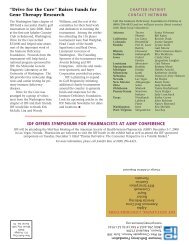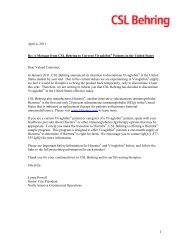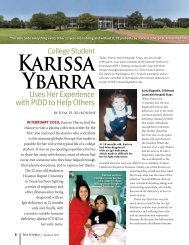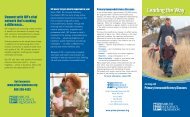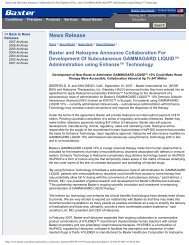IDF Patient & Family Handbook for Primary Immunodeficiency ... - IDFA
IDF Patient & Family Handbook for Primary Immunodeficiency ... - IDFA
IDF Patient & Family Handbook for Primary Immunodeficiency ... - IDFA
Create successful ePaper yourself
Turn your PDF publications into a flip-book with our unique Google optimized e-Paper software.
106 Infants and Children with <strong>Primary</strong> <strong>Immunodeficiency</strong> Diseases<br />
Coordinating Your Child’s Care continued<br />
In addition to bringing the diary to each medical<br />
visit, additional suggestions when visiting a<br />
medical professional include:<br />
• Have a list of questions prepared in writing.<br />
Doctors cannot spend as much time as they<br />
would like with each patient, so be ready with<br />
your list of questions.<br />
• Remember to take notes. When possible,<br />
take another family member or friend along on<br />
the visit. It is always wise to have more than<br />
one person familiar with the patient’s medical<br />
routine. This will allow you time to visit with the<br />
doctor individually, if necessary, as well.<br />
Designate a special tote bag just <strong>for</strong> these medical<br />
visits. The tote should contain:<br />
• A couple of toys or age-appropriate activities.<br />
It may not be wise to share toys at the doctor’s<br />
office; you don’t want to go home with more<br />
germs.<br />
• Favorite books or a new book can help your<br />
child stay occupied and calm during long<br />
waiting periods.<br />
• A notebook <strong>for</strong> taking notes<br />
• A contact list with names and phone numbers<br />
of family, friends, and school personnel<br />
Sometimes you and your child will go <strong>for</strong> tests<br />
immediately after the visit or the visit could be<br />
extended <strong>for</strong> other reasons. Be prepared <strong>for</strong> a<br />
change in plans or long office visits. For instance,<br />
you may need to make other arrangements <strong>for</strong><br />
your other children.<br />
Encourage the medical professional to<br />
communicate directly to your child when possible.<br />
Although your child may be young, it is always<br />
appropriate <strong>for</strong> him or her to build a relationship<br />
with involved healthcare providers.<br />
Ask <strong>for</strong> written instructions concerning medicines<br />
and treatments. This will help avoid mistakes by all<br />
parties, as well as give you written instructions to<br />
be placed in your medical diary.<br />
Normalizing Your Child’s Life<br />
When a child has a chronic health condition,<br />
everyone in the family is affected. Parents may<br />
be tempted to be overprotective, which is a very<br />
natural response as it reflects the concern of<br />
keeping the child as healthy as possible. It is also<br />
common <strong>for</strong> parents to want to compensate <strong>for</strong><br />
the additional challenges their child with a primary<br />
immunodeficiency faces.<br />
Such challenges may include:<br />
• coping with symptoms that may be<br />
uncom<strong>for</strong>table or hinder regular activities<br />
• daily treatments or medicines<br />
• trips to the physician’s office<br />
• uncom<strong>for</strong>table procedures<br />
It may be a natural inclination to compensate <strong>for</strong><br />
challenges by loosening rules and expectations<br />
or by providing rewards. However, the loosening<br />
of rules, or provision of extra rewards, may result<br />
in some undesired consequences. For instance,<br />
children may recognize when parents change what<br />
is expected of them and worry about why this<br />
has changed or what the change means. Some<br />
children may even wonder if it means their illness<br />
is getting worse. Changes in expectations, or<br />
expectations that are different from their siblings,<br />
may also serve to confirm the child’s concerns<br />
about being different and he or she may perceive<br />
that difference negatively. In addition, children<br />
may expect this special treatment to continue<br />
even when parents or other caregivers begin to<br />
transition to more typical behavioral expectations,<br />
creating a potential cause of friction in the family.<br />
Finally, brothers and sisters are also likely to<br />
sense a difference in behavioral expectations<br />
and may become jealous and/or resentful of<br />
the attention and rewards the child with primary<br />
immunodeficiency receives.<br />
It is helpful to remember that children need limits<br />
and consistent expectations and responses to<br />
their behavior. This provides security to children<br />
by increasing the predictability of their world.<br />
Developing and maintaining expectations, or<br />
“family rules” <strong>for</strong> all children in the family helps









